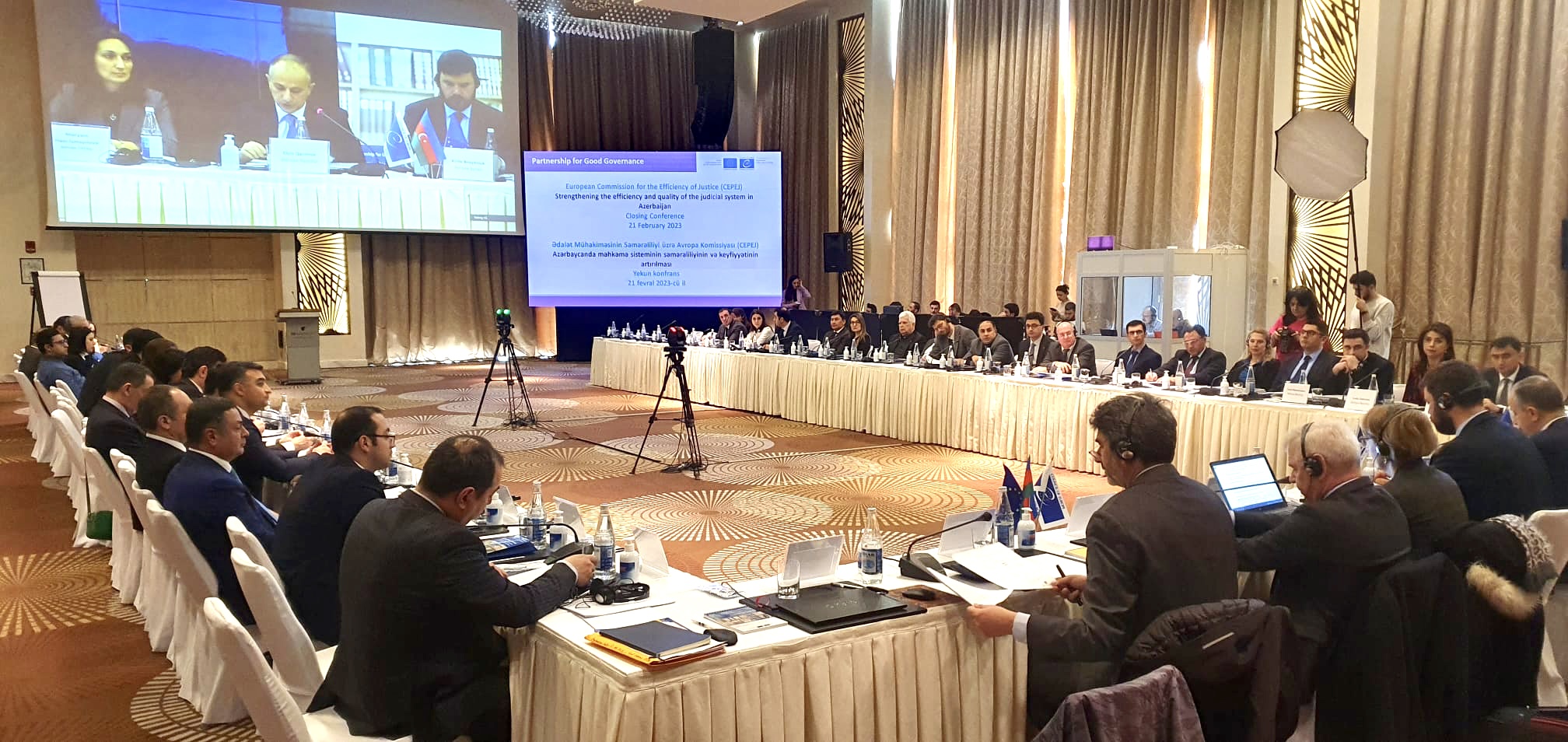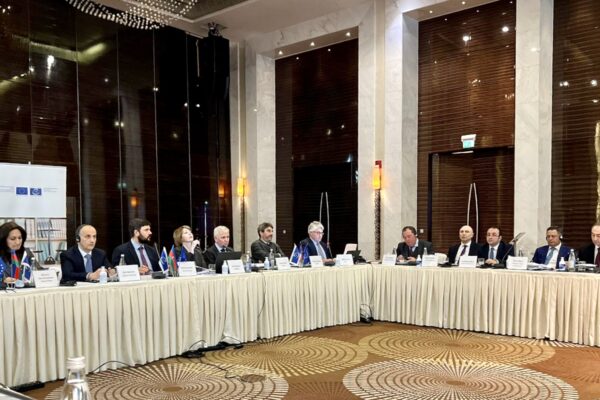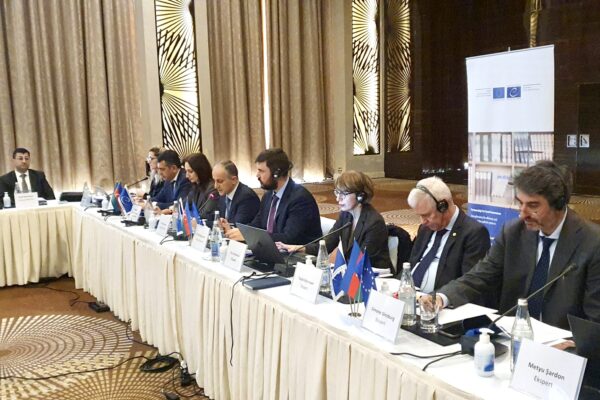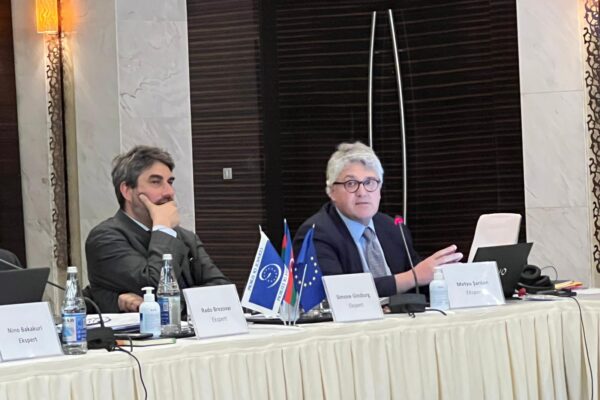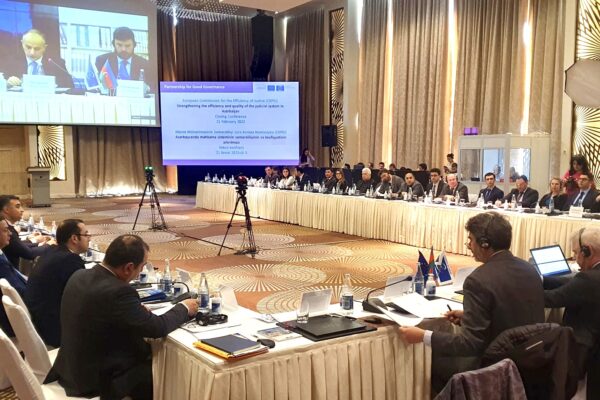Final conference of the European Union-Council of Europe Partnership for Good Governance II (PGG II) project in Baku (Azerbaijan) on 21 February 2023.
Mathieu Chardon, Secretary General of the UIHJ, CEPEJ (Council of Europe’s European Commission for the efficiency of Justice) expert, participated in this closing conference of the project on the theme of “The Efficiency and Quality of the Judicial System in Azerbaijan – Advancing Along the CEPEJ Recommendations”.
As part of this project, Jos Uitdehaag, First Vice-President of the UIHJ, CEPEJ expert, and Mathieu Chardon, wrote two reports. Jos Uitdehaag also attended the conference, as well as about 60 representatives of the Ministry of Justice of the Republic of Azerbaijan, judges, representatives of the Department of Enforcement of the Ministry of Justice of the Republic of Azerbaijan, representatives of civil society, and experts.
In his capacity as conference moderator, Kyrylo Boichenuk, Deputy Head of the Council of Europe Office in Baku, praised the remarkable work carried out by the Council of Europe since March 2019 in the framework of the project. He indicated that the purpose of the conference was to present the results of the project.
Frédéric Dolt, Head of Department for the Implementation of Human Rights, Justice and Legal Co-operation Standards of the Council of Europe (online), spoke about an ambitious project. He recalled that, for 20 years, the CEPEJ has been supporting judicial systems to strengthen them and its members in the modernisation of justice, while conducting work on the evaluation of judicial systems, judicial time management, quality justice, mediation and Cyber-justice. The CEPEJ provides various tools, including technical assistance. Since 2012, the Republic of Azerbaijan has benefited from these programs, in particular the PGG I program of which the PGG II project is the continuation. He recalled the importance of access to a fair trial referred to in Article 6 of the European Convention on Human Rights. He also mentioned the work of the project, particularly in the area of enforcement of court decisions. He expressed his thanks to all the actors of the project, including the CEPEJ experts, and the European Union for its trust.
Elchin Gasimov, Head of General Department of Strategic Planning and Monitoring of the Ministry of Justice of the Republic of Azerbaijan, thanked the Council of Europe for its support over the years and the fruitful cooperation he detailed.
Maryam Haji-Ismayilova, International Aid and Cooperation Officer, European Union Delegation to Azerbaijan, in turn thanked all the project participants, addressing the numerous trainings and evaluations carried out.
A general presentation of the results of the project was made by Jovana Matic, Project Coordinator, CEPEJ Secretariat. The results presented covered four broad topics.
The first topic concerned the “Road map and Action plan on dissemination of CEPEJ efficiency and quality measurement tools in all courts of Azerbaijan”. It was presented by Rado Brezovar, Secretary General of the Supreme Court of Slovenia, CEPEJ expert, Nino Bakakuri, Judge at the Supreme Court of Georgia, CEPEJ expert, and Leyla Zakirova, Group leader at the General Department of Strategic Planning and Monitoring of the Ministry of Justice of the Republic of Azerbaijan, National Correspondent of the CEPEJ in Azerbaijan.
The second topic concerned the “Report on consultations to define the indicators and track the records able to demonstrate the effect of judicial reforms in Azerbaijan”. It was presented by Rado Brezovar, Nino Bakakuri, and Seyfalpasha Aliyev, Head of Anti-corruption and Court monitoring section of the Apparatus of Judicial Legal Council of the Republic of Azerbaijan.
The third topic covered the two reports written by Jos Uitdehaag and Mathieu Chardon, on “Recommendations on setting up a system of enforcement timeframes and recovery rates as indicators on the efficiency of the enforcement system and in view of evaluating the enforcement agent’s performance” and the “Recommendations on the development of ICT solutions to support the national enforcement system of Azerbaijan”. It was presented by Mathieu Chardon and Tural Mammadov, Group leader (on electronic information) at the General Department of Enforcement of the Ministry of Justice of the Republic of Azerbaijan. Mr. Mammadov indicated that several of the proposed recommendations were being implemented.
The fourth topic concerned the “Report with recommendations on improving the work efficiency of the Supreme Court of the Republic of Azerbaijan based on CEPEJ methodologies and tools”. It was presented by Nino Bakakuri, Simone Ginzburg, independent consultant on e-Justice and judicial reform (Italy), CEPEJ expert, Rado Brezovar, and Ilkin Rajabov, judge at the Supreme Court of the Republic of Azerbaijan.
Finally, a presentation of the results achieved through the cooperation between the CEPEJ and the Republic of Azerbaijan under PGG II was given by Elchin Khalafov, Pro-rector of the Justice Academy of the Ministry of Justice of the Republic of Azerbaijan, Ilgar Jafarov, Head of the General Department Enforcement of enforcement of the Ministry of Justice of the Republic of Azerbaijan, Seyfalpasha Aliyev, and Islam Aliyev, President of Baku city Yasamal District Court (Pilot Court).
The conference was closed by Ramin Garagurbanli, judge of Baku Court of Appeal of the Republic of Azerbaijan, former President of the CEPEJ. He praised the cooperation between all parties during these four years. The CEPEJ developed a number of tools, guidelines, which were central to the project. He recalled that the CEPEJ, which represents 46 European States, as well as other countries such as Israel, Kazakhstan or Morocco, benefits from the experience of all these countries, in order to enable everyone to comply with the requirements of the European Convention on Human Rights, and in particular its article 6. He thanked the European Union for its financial support, the Council of Europe and the CEPEJ, as well as all those involved in the PGG II project, in the waiting for a PGG III project.

